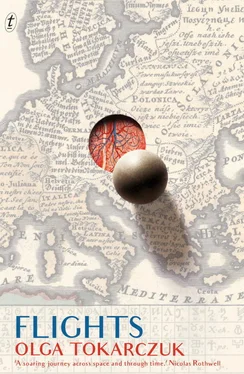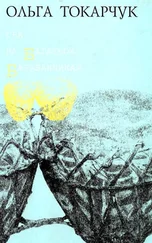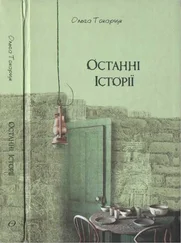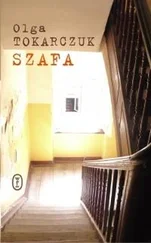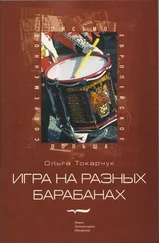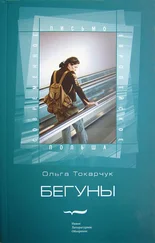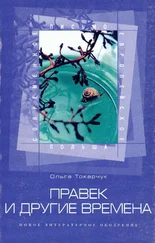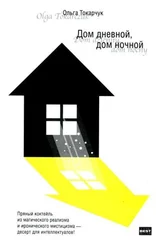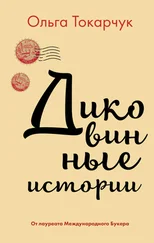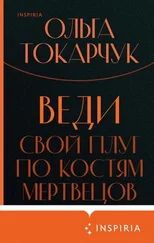The next day the shrouded woman is back, swaying on stiff legs and shouting out curses that sound like gibberish. Annushka stands in her line of vision, on the other side of the passageway, but the woman evidently does not see her, lost in her lamentations. Finally Annushka, taking advantage of a momentary lapse in the crowds, goes and stands right in front of her.
‘Let’s go, I’ll buy you a roll.’
The woman stops, snapped out of her trance, rubs her gloved hands together, stamps her feet like a saleswoman at a bazaar who is frozen to the bone. They go up to the kiosk together. Annushka is truly happy to see her.
‘What’s your name?’ she asks.
The woman, busy with her roll, merely shrugs. But a moment later she says with her mouth full:
‘Galina.’
‘I’m Annushka.’
That’s it for conversation. Finally, when the frost drives her back towards the station, Annushka asks another question:
‘Galina, where do you sleep?’
The shrouded woman tells her to come back to the kiosk when the metro closes.
All evening Annushka rides the same line and indifferently examines her own face reflected in the window against the dark walls of the underground tunnels. She already recognizes at least two people. She wouldn’t dare try to talk to them. She’s travelled a few stops now with one of them – there is a tall, thin man, not old, perhaps even young, it’s hard to say. His face is covered in a sparse light-coloured beard that comes down to his chest. He’s wearing a flat cloth cap, a worker’s cap, ordinary and threadbare, a long grey overcoat, pockets stuffed with something, and a weathered backpack. Then tall lace-up boots with homemade socks protruding out of them, the legs of his brown trousers tightly tucked in. He seems to not be paying attention to anything, immersed in his own thoughts. With verve he hops out onto the platform, giving the impression that he’s heading for some distant but concrete destination. Annushka has also seen him twice from the platform; once he was sleeping on some completely deserted train that seemed to be retiring for the night; the other time he was also dozing, resting his forehead against the glass; his breath conjured up a mist that concealed half his face.
The other one Annushka remembers is an old man. He walks with difficulty, with a cane, or rather, a walking stick, a thick piece of wood that curves a little at the end. When he gets into a carriage he has to hang on to the door with his other hand, and usually somebody helps him then. Once inside people give up their seats for him, reluctantly, but they do it. He looks like a beggar. Him Annushka does try to hunt down, as she hunted down the shrouded woman earlier. But all she manages to do is ride with him for some time in the same carriage, stand in front of him for more or less half an hour, so that she knows by heart every detail of his face, his clothing. She isn’t brave enough to talk to him, however. The man keeps his head down, not paying attention to what’s happening around him. Then a crowd of people going home from work sweeps her away. She lets herself be carried by this warm stream of scents and touches. She becomes free of it only after it has carried her through the turnstiles, as though the underground had spit her out like some foreign body. Now she will have to buy a ticket to go back in, and she knows that she will run out of money soon enough.
Why does she remember those two? I suspect because they’re constant, somehow, as though they moved differently, more slowly. Everyone else is like a river, a current, water that flows from here to there, creating eddies and waves, but each particular form, being fleeting, disappears, and the river forgets about them. But those two move against the current, which is why they stand out the way they do. And why they aren’t bound by the river’s rules. I think that this is what attracts Annushka.
When they close the metro she waits in front of the side entrance for the shrouded woman and just when she gives up, the woman finally appears. Her eyes are covered, and with all those layers of clothing her shape is that of a barrel. She tells Annushka to follow her, and Annushka obeys. She is very tired, to be frank, has no energy at all and would be thrilled to just sit down somewhere, anywhere. They walk along the bridge of boards over the excavation, passing tin fencing pasted over with posters, and then they go down into an underground passageway. For a while they walk down a narrow corridor, where it is pleasingly warm. The woman indicates a place for Annushka on the floor, and Annushka lies down without getting undressed and immediately falls asleep. As she’s dozing, just as she has always wanted – deeply, without a thought in her head – the image she just saw walking down the cramped corridor returns for a moment under her eyelids.
A dark room, and in it an open door that leads into another room, bright. Here there is a table, and people sitting around it. Their hands are arranged on the tabletop, and they are sitting up straight. They sit and look at each other in absolute silence and without moving. She could swear that one of those people is the man in the worker’s cap.
Annushka sleeps soundly. Nothing wakes her, no rustling, no creaking of the bed, no TV. She sleeps as though she were a piece of rock against which stubborn waves are crashing, or a tree that has fallen and is now being covered by moss and mushroom spawn. Just before waking she has a funny dream – that she’s playing with a colourful toiletry bag, with a pattern of little elephants and kittens, which she’s turning over in her hands. And then suddenly she lets it go, only the bag doesn’t fall, it hangs between her hands, suspended in mid-air, and Annushka finds that she can play with it without even touching it. That she can move it with the power of her will. It’s a very pleasant realization, with a great joy in it that she hasn’t felt for a long time, since childhood, in fact. So she wakes up in a good mood, and now sees that this is not some abandoned workers’ dormitory at all, as she’d thought yesterday, but rather a common boiler room. That’s why it’s so warm in here. And she is sleeping on cardboard laid out alongside a pile of coal. On a piece of newspaper lies a quarter loaf of bread, quite stale, and an ample helping of lard mixed with hot pepper. She guesses this is from Galina, but she won’t touch the food until she has relieved herself in the disgusting bathroom without doors, and managed to wash her hands.
Oh, how good it feels – how incredibly good – to become part of a crowd that gradually warms up. Overcoats and furs give off the smells of people’s homes – grease, detergent, sweet perfumes. Annushka goes through the turnstile and from there allows herself to be carried by the first wave. The Kalininskaya line this time. She stands on the platform, then feels the warm underground air. No sooner do the doors open than Annushka finds herself inside, pressed between bodies, so much so she doesn’t need to hold on. When the train curves she gives into that motion, sways like grass amidst more grass, a blade among other grains. At the next station people still get on although you really couldn’t even squeeze a match in now. Annushka half-closes her eyes and feels as though her hands were being held, as though from all sides she were being embraced affectionately and rocked by reassuringly kind hands. Then suddenly they pull into a station where many people get off the train, and one must stand on one’s own two feet again.
When the carriage almost completely empties out near the final station, she finds a newspaper. At first she stares at it suspiciously – maybe she’s forgotten how to read – but then she picks it up and anxiously leafs through it. She reads about a model who’s died of anorexia, and how the authorities are thinking about prohibiting overly skinny girls from being displayed on the runways. She also reads about terrorists – yet another plot’s been foiled. TNT and detonators found in an apartment. She reads of disoriented whales swimming up onto beaches where they die. Of the police tracking down a ring of paedophiles on the internet. Of the forecast predicting it will get colder. Of mobility becoming reality.
Читать дальше
